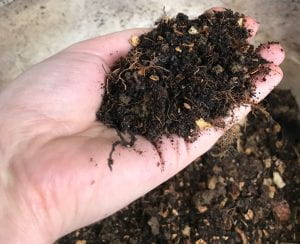It’s officially autumn in New York, and the time has come for soil testing and slowing down production. Day-neutral strawberries and fall-bearing raspberries may still be going strong, but most berry crops have finished for the season.
Now may be a good time to think about composting on the farm. If you find yourself moving a lot of crop residue, animal manure, and food waste, a compost system can help you recycle the nutrients in these materials. Compost can be used as mulch and a soil conditioner, and composted animal manure can be used as fertilizer.
Berry plants love compost– it suppresses weeds as a mulch, provides slow nutrition to the plant, and can retain moisture to keep plants hydrated during dry spells. Apply compost in the springtime all through June.
If you are growing blueberries and purchase composted manure, be sure to ask your supplier whether they use lime in any part of the livestock’s bedding. Lime (the white powder) can speed decomposition of manure and reduce the smell, but it also raises the pH of the resulting compost. This can create extra challenges if applied to a blueberry planting.
Compost systems vary widely in the amount of time, money, and space that they require. If you are considering learning more about compost systems to find what would work best for your farm, here are some helpful resources.
Here is a visual guide to different compost systems and the resources that they require.
Here is the Cornell Waste Management Institute website, a place with information about composting for large operations, small operations, the science of composting, a map to find a compost provider near you, and so much more!
Here is a free online handbook about on-farm composting with a great deal of information about how to compost farm wastes.
If you’d like more hands-on support with your compost system, start by contacting your county’s Cornell Cooperative Extension office to learn more about the composting programs they have available.
Featured resources:
Composting | Cornell Waste Management Institute

